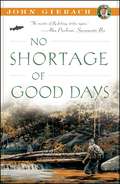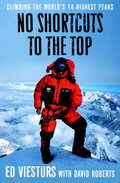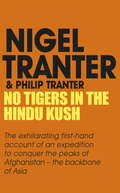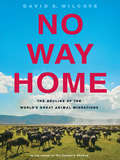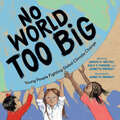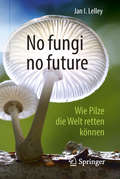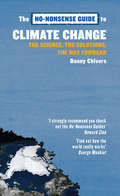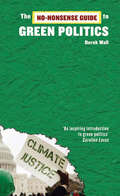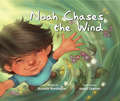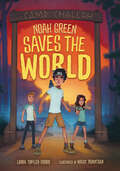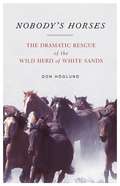- Table View
- List View
No Safe Anchorage: Flight, Exile, Loss and Hope
by Liz MacRae ShawTom Masters, a nineteenth century naval officer, is a round peg in a square hole. A tantalising glimpse of a stranger leads him to jump ship on a quest to find her. His adventures, interwoven with the life of a young Robert Louis Stevenson, take Tom from the Isle of Skye to Canada. There he encounters others who have been jettisoned by society, including Silent Owl, a Native American who becomes his soulmate. But, danger and exposure threaten Tom's every move as he is forced to continue on his journey...
No Safe Place: Toxic Waste, Leukemia and Community
by Phil Brown Edwin J. MikkelsenThis book documents the suffering and the difficulties born out of the Woburn case. It offers a clinical, yet compassionate glimpse into the minds of people for whom environmental contamination meant severe illness and often death and holds out a hope that through communal support and political action the world can be made a safer place.
No Sand In The House!
by Jennifer L. CrawfordHurricane Sandy Children's Book: Rules are meant to be followed but when a hurricane comes to the Jersey Shore does Mother Nature know that there should be "no sand in the house?"This heart-warming children's tale follows a sister and brother as they try to follow their Grandpa's number one rule: No sand in the house! The children try creative ways to keep the sand out and don't want to know what will happen if sand is brought in! It is, essentially, a story of hope. A portion of the proceeds from the sale of this book will be donated to charitable organizations that are working to rebuild the Jersey Shore after Hurricane Sandy's destruction in 2012.
No Scrap Left Behind: My Life Without Food Waste
by Teralyn PilgrimThe story of a mother&’s quest to end her family&’s food waste—and all the blunders that came with it.Teralyn Pilgrim had no idea the environmental and economic impact of food waste, or that she could save $100 a month by being waste free. But when a story of hungry children fills her with unbearable guilt, she decided to make a change to the way her family approached mealtime. Despite finicky kids and a skeptical husband, Pilgrim turned her feelings of guilt into action and created a zero-food waste kitchen. Pilgrim began her journey by defining food waste with Rule #1: the Hungry Kid Test—would you throw something edible away with a hungry child watching? If the answer is yes, it can go in the compost. If the answer is no, then it&’s time to get creative. Narrating her trials and errors—emphasis on errors—Pilgrim invites readers to her table where leftover food is a personal challenge to reduce waste, save money, and guard against squandering natural resources. Things get tricky when she discovers a five-year-old fish in her freezer, accidentally buys the grossest fat-free cookies in the world, and finds her dog is as picky as the kids. Addressing myths about how being waste-free is too hard (it&’s not) and whether expiration dates mean anything (they don&’t), Pilgrim teaches readers clever ways to be resourceful while also offering a broader look at why food waste matters and the global effects of this massive problem. Both a resource for families and a call for worldwide change, No Scrap Left Behind offers nine-step program and hundreds of food-related tips to help readers find their own way to sustainable living, trim the grocery bill, and effect change...starting in their own kitchens.
No Shortage of Good Days (John Gierach's Fly-fishing Library)
by John GierachIN his new book about the delightful torture known as fly fishing, John Gierach again demonstrates the wit, eloquence, and insight that have become his trademarks. Consider this observation about fishing: "From my own experience I can say that a bad back makes you hike slower, stove-up knees keep you from wading confidently, tendinitis of the elbow buggers your casting, and a dose of giardia can send you dashing into the bushes fifteen times in an afternoon, but although none of this is fun, it's discernibly better than not fishing." Or this explanation for every fisherman's fascination with small streams: "The idea is to fish obscure headwater creeks in hopes of eventually sniffing out an underappreciated little trout creek down an un-marked dirt road. Why is another question. I suppose it's partly for the fishing itself and partly to satisfy your curiosity, but mostly to sustain the belief that such things are still out there to find for those willing to look." And perhaps the ultimate explanation for the fishing obsession: "I briefly wondered how much trouble a guy should go to in order to catch a few little trout, but then any fish becomes worth catching to the extent that you can't catch it, so the answer was obvious: Once you decide to try, you go to as much trouble as it takes." In No Shortage of Good Days Gierach takes usfrom the Smokies in Tennessee to his home waters in Colorado, from the Canadian Maritimes to Mexico--saltwater or fresh, it's all fishing and all irresistible. As always he writes perceptively about a wide range of subjects: the charm of familiar waters, the etiquette 27.99 of working with new fishing guides, night fishing when the trout and the mosquitoes are both biting, fishing while there is still slush on the river, fishing snobbery, and the delights of fresh fish cooked and eaten within sight of where it was caught. No Shortage of Good Days may be the next best thing to a day of fishing.
No Shortcuts to the Top
by David Roberts Ed Viesturs<P>This gripping and triumphant memoir from the author of The Mountain follows a living legend of extreme mountaineering as he makes his assault on history, one 8,000-meter summit at a time. <P>For eighteen years Ed Viesturs pursued climbing's holy grail: to stand atop the world's fourteen 8,000-meter peaks, without the aid of bottled oxygen. But No Shortcuts to the Top is as much about the man who would become the first American to achieve that goal as it is about his stunning quest. As Viesturs recounts the stories of his most harrowing climbs, he reveals a man torn between the flat, safe world he and his loved ones share and the majestic and deadly places where only he can go. <P>A preternaturally cautious climber who once turned back 300 feet from the top of Everest but who would not shrink from a peak (Annapurna) known to claim the life of one climber for every two who reached its summit, Viesturs lives by an unyielding motto, "Reaching the summit is optional. Getting down is mandatory." It is with this philosophy that he vividly describes fatal errors in judgment made by his fellow climbers as well as a few of his own close calls and gallant rescues. And, for the first time, he details his own pivotal and heroic role in the 1996 Everest disaster made famous in Jon Krakauer's Into Thin Air. In addition to the raw excitement of Viesturs's odyssey, No Shortcuts to the Top is leavened with many funny moments revealing the camaraderie between climbers. It is more than the first full account of one of the staggering accomplishments of our time; it is a portrait of a brave and devoted family man and his beliefs that shaped this most perilous and magnificent pursuit. <P><b>A New York Times Bestseller</b>
No Such Thing as Failure: My Life in Adventure, Exploration, and Survival
by David Hempleman-AdamsIf there's an adventure to be had, it's likely that David Hempleman-Adams has been there first. Ranking alongside Ranulph Fiennes and Chris Bonnington in the pantheon of British explorers, David Hempleman-Adams is the first person in history to achieve what is termed the Adventurers' Grand Slam, by reaching the Geographic and Magnetic North and South Poles as well as climbing the highest peaks on all seven continents. But this feat is merely tip of the iceberg. Having reaching the summit of Everest on the more difficult north side and flown across the Atlantic in a an open wicker basket hot-air balloon, Hempleman-Adams is without question of the hardest, toughest, most fearless men to push the limits of human survival. The question Hempleman-Adams is most often asked is, simply: what drives him on? Why risk frostbite pulling a sledge to the North Pole? Why experience the Death Zone on Everest? Why fly in the tiny basket of a precarious balloon across the Atlantic? Is it simply the case that he likes to push himself to the limits, or is there something more to it? No Such Thing as Failure answers these questions and more, uncovering what drives arguably the world's greatest adventurer.
No Takebacks: A Give & Take 1.5 Novella (Give & Take)
by Kelli MaineA sexy novella in the Give & Take series from USA Today bestselling author Kelli Maine continuing the passionate love affair between the irresistible Merrick Rocha and the woman he will do anything for.HIS PAST MAY DESTROY THEIR FUTURE: The man Rachael DeSalvo loves more than anything is suffering in silence. The grand opening of Turtle Tear Resort should be a time of celebration for Merrick Rocha. But he's suddenly intent on selling off the business he built from the ground up-and Rachael's hell-bent on finding out why. Only one man can give her the answers she seeks, but meeting with him would be the ultimate betrayal to Merrick. Merrick once asked Rachael to trust him against all odds...can he do the same?A novella in the Give & Take series.Don't miss the rest of the exhilarating Give & Take series: Taken, Taken By Storm, Take Me Back, Given and Take This Man.
No Thoughts Just Corgis: A Comprehensive Compendium of Cuteness
by Union Square & Co.When you&’ve got the itch to snuggle with a soft loaf of freshly baked bread, when you wish upon a star for a sentient beige throw pillow with legs, the world answers you with corgis! Regal, smart, loyal, and surprisingly athletic, the corgis in this book—spread out over 90 photos—will answer the call for a canine cuddle of any and every kind.
No Tigers in the Hindu Kush
by Nigel Tranter Philip TranterPhilip Tranter and three friends drove a Land Rover 6,000 miles overland from Scotland to Nuristan to explore some of the unknown Central Hindu Kush area. They set out to attempt the second ascent of the monstrous Koh-i-Krebek; to ascend if possible at least one other major unclimbed mountain and to map that previously unmapped terrain. In fact, as well as Krebek they climbed nine other major peaks, named another dozen, and established the existence of a dramatic rock and ice range which they called the Rum Mountains, and christened individually after the Hebridean peaks they resembled in shape and beauty. The story of the expedition is told with an infectious enthusiasm for the glory and challenge of these mysterious peaks.
No Timber Without Trees: Sustainability in the tropical forest (Natural Resource Management Set)
by Duncan PooreMuch of the world's tropical timber is still supplied from natural forest, but under current systems of management the forests are rapidly becoming exhausted. Unless management practices change to become genuinely sustainable, neither the forests nor the essential contribution of the timber industry to many economies will survive. Duncan Poore reviews the extent to which natural forests are already being sustainably managed for timber production, and looks at how these practices can be enlarged. He places management for timber in the wider context of tropical forest conservation and outlines a strategy for further action. Thoroughly researched and accessibly written, this book will be useful for everyone working or interested in the subject of tropical forests. Foreword by Dato Dr B.C.Y. Freezailah Originally published in 1989
No Traveller Returns: A Novel (Louis L'Amour's Lost Treasures)
by Louis L'Amour Beau L'AmourLouis L’Amour’s long-lost first novel, faithfully completed by his son, takes readers on a voyage into danger and violence on the high seas. Fate is a ship. As the shadows of World War II gather, the SS Lichenfield is westbound across the Pacific carrying eighty thousand barrels of highly explosive naphtha. The cargo alone makes the journey perilous, with the entire crew aware that one careless moment could lead to disaster. But yet another sort of peril haunts the Lichenfield. Even beyond their day-to-day existence, the lives of the crew are mysteriously intertwined. Though each has his own history, dreams and jealousies, longing and rage, all are connected by a deadly web of chance and circumstance. Some are desperately fleeing the past; others chase an unknown destiny. A few are driven by the desire for adventure, while their shipmates cling to the Lichenfield as their only true home. In their hearts, these men, as well as the women and children they have left behind, carry the seeds of salvation or destruction. And all of them—kind or cruel, strong or broken—are bound to the fate of the vessel that carries them toward an ever-darkening horizon. Inspired by Louis L’Amour’s own experiences as a merchant seaman, No Traveller Returns is a revelatory work by a world-renowned author—and a brilliant illustration of a writer discovering his literary voice.Advance praise for No Traveller Returns“A highly entertaining nautical adventure . . . Beau L’Amour has done his father’s fans a service by showcasing the future bestselling author’s already developed storytelling and mature insights into human nature.”—Publishers Weekly (starred review) “Although L’Amour’s name will be forever linked with the American West, fans should welcome the opportunity to read some of his early work. . . . The insight into each character is typical of everything L’Amour ever wrote.”—Booklist
No Way Home: The Decline of the World's Great Animal Migrations
by David S. WilcoveAnimal migration is a magnificent sight: a mile-long blanket of cranes rising from a Nebraska river and filling the sky; hundreds of thousands of wildebeests marching across the Serengeti; a blaze of orange as millions of monarch butterflies spread their wings to take flight. Nature's great migrations have captivated countless spectators, none more so than premier ecologist David S. Wilcove. In No Way Home, his awe is palpable--as are the growing threats to migratory animals. We may be witnessing a dying phenomenon among many species. Migration has always been arduous, but today's travelers face unprecedented dangers. Skyscrapers and cell towers lure birds and bats to untimely deaths, fences and farms block herds of antelope, salmon are caught en route between ocean and river, breeding and wintering grounds are paved over or plowed, and global warming disrupts the synchronized schedules of predators and prey. The result is a dramatic decline in the number of migrants. Wilcove guides us on their treacherous journeys, describing the barriers to migration and exploring what compels animals to keep on trekking. He also brings to life the adventures of scientists who study migrants. Often as bold as their subjects, researchers speed wildly along deserted roads to track birds soaring overhead, explore glaciers in search of frozen locusts, and outfit dragonflies with transmitters weighing less than one one-hundredth of an ounce. Scientific discoveries and advanced technologies are helping us to understand migrations better, but alone, they won't stop sea turtles and songbirds from going the way of the bison or passenger pigeon. What's required is the commitment and cooperation of the far-flung countries migrants cross--long before extinction is a threat. As Wilcove writes, "protecting the abundance of migration is key to protecting the glory of migration." No Way Home offers powerful inspiration to preserve those glorious journeys.
No World Too Big: Young People Fighting Global Climate Change
by Jeanette Bradley Lindsay H. Metcalf Keila V. DawsonFans of No Voice Too Small will be inspired by young climate activists who made an impact around climate change in their communities, countries, and beyond.Climate change impacts everyone, but the future belongs to young people. No World Too Big celebrates twelve young activists and three activist groups on front lines of the climate crisis who have planted trees in Uganda, protected water in Canada, reduced school-bus climate footprint in Indonesia, invented alternate power sources in Ohio, and more. Fourteen poems by Vanessa Brantley-Newton, David Bowles, Rajani LaRocca, Renée LaTulippe, Heidi E. Y. Stemple, and others honor activists from all over the world and the United States. Additional text goes into detail about each activist's life and how readers can get involved.
No es un frijol
by Claudia Guadalupe Martinez¡AHORA EN ESPAÑOL! Un frijol saltarín mexicano no es un frijol en absoluto. ¡Es un fascinante hogar y fuente de alimento para un tipo especial de oruga!NOW IN SPANISH! A Mexican jumping bean isn't a bean at all. It's a fascinating home and food source for a special kind of caterpillar!Este cuento poético comparte el ciclo de vida de un frijol saltarín mexicano. Este curioso insecto saltarín es en realidad una vaina de semilla de un arbusto llamado yerba de la flecha, en la cual una oruga se adentra, viviendo dentro de la vaina hasta que construye un capullo y emerge como una polilla. Perfecto para preescolares y niños que aún no leen, este creativo libro ilustrado explora la vida diaria del frijol saltarín mexicano y su eventual transformación y escape de la vaina.This poetic story shares the life cycle of a Mexican jumping bean. This curious jumping insect is actually a seedpod from a shrub called yerba de la flecha, into which a caterpillar burrows, living inside the pod until it builds a cocoon and breaks out as a moth. Perfect for preschoolers and prereaders, this creative picture book explores the Mexican jumping bean's daily life and eventual transformation and escape from the pod.
No es un perro (Spanish Edition)
by Claudia Guadalupe Martinez¡Edición en español! ¡El perrito de la pradera mexicano no es un perro en lo absoluto! Es parte de la familia de los roedores y es una especie en peligro de extinción. Un divertido y entretenido libro ilustrado de no ficción para niños de 3 a 7 años que presenta el ciclo de vida del perrito de la pradera mexicano y un ingenioso concepto de formas.Spanish language edition! The Mexican prairie dog is not a dog at all! It's part of the rodent family, and is an endangered species.A fun and engaging nonfiction picture book for kids ages 3-7 that features the life cycle of the Mexican prairie dog and clever shapes concept.Un perrito de la pradera mexicano puede parecer un perro, pero ciertamente no lo es. Este mamífero adorable en realidad forma parte de la familia de los roedores.No es un perro explora el ciclo de vida del perrito de la pradera mexicano, la contribución de la especie a un ecosistema sano y las maneras en las cuales la agricultura ha destruido su hábitat y lo ha convertido en una especie en peligro de extinción.Perfecto para niños preescolares o que aún no leen, ¡esta encantadora e informativa lectura en voz alta presenta a niños curiosos un animal único que NO es un perro!A Mexican prairie dog may look like a dog, but it is certainly not a dog. This adorable mammal is actually part of the rodent family.Not a Dog explores the life cycle of the Mexican prairie dog, the species' contribution to a healthy ecosystem, and the ways in which farming has destroyed their habitat and made them an endangered species. Perfect for preschoolers and pre-readers, this charming and informative read-aloud introduces curious kids to one unique animal that is NOT a dog!
No fungi no future: Wie Pilze Die Welt Retten Können
by Jan I. LelleyDas Buch für naturwissenschaftlich interessierte Leser, die sich Gedanken machen über die anstehenden Probleme einer zahlenmäßig rasch zunehmenden Weltbevölkerung. Das Buch klärt über den bisher allgemein kaum bekannten Nutzen der sogenannten Großpilze auf. Es sind Pilze, die man sonst von Spaziergängen in Wald und Wiese kennt und die man im Handel kaufen kann. Wie können Großpilze dazu beitragen die Menschheit zu retten?Können Ernährungsprobleme in armen Ländern Afrikas durch Großpilze gelöst werden?Gelingt eine Revitalisierung ganzer geschädigter Wälder?Und was haben Pilze auf dem Mars zu suchen?Diese und weitere spannende Fragen werden im Verlauf der Kapitel beantwortet. Die Leser bekommen Einblicke in die Geheimnisse und Arbeitsweisen einer Wissenschaft, die, wie auch Pilze, im Verborgenen aktiv ist, deren Bedeutung rapide steigt, obwohl sie bisher nur von relativ wenigen Forschern betrieben wird.
No more than the feathers of a wing
by Alessandro CaselliThief is a young magpie who decides not to leave the nest as she is too attached to its walls and all the objects inside it. But these objects also weigh her life down to the point that in the end she has to make a drastic choice. Will she carry on living a lonely life as a slave to her desires or will she change direction and face a life that is just as solitary but free from the chains that Thief herself had used to tie her to her “treasures”?
No más que las plumas de un ala
by Alessandro CaselliThief es una joven urraca que decide no abandonar el nido porque está muy apegada a sus paredes y a todos los objetos que tiene dentro. Pero estos objetos pesarán también en su vida, hasta obligarla a hacer una drástica elección: continuar viviendo una existencia solitaria y esclava de sus deseos, o cambiar de dirección y afrontar una vida quizás también solitaria pero libre de cadenas a las que Thief se había adherido con sus “tesoros”.
No-Nonsense Guide to Climate Change: The Science, the Solutions, the Way Forward (No-Nonsense Guides #3)
by Danny ChiversJust as the need for action on climate change becomes more urgent and overwhelming, the campaign to deny that humans are causing it has gained more traction. This completely new book meets the skeptics head on, offering a guide to the science, an insight into the politics of climate justice and a clear sense of the way forward. This is an ideal offering for students, academics and anyone interested in the growing issue of society’s impact on climate change and how to make climate justice a reality.
No-Nonsense Guide to Green Politics (No-Nonsense Guides #13)
by Derek WallClimate chaos and pollution, deforestation and consumerism: the crisis facing human civilization is clear enough. But the response of politicians has been cowardly and inadequate, while environmental activists have tended to favour single-issue campaigns rather than electoral politics. The No-Nonsense Guide to Green Politics measures the rising tide of eco-activism and awareness and explains why this event heralds a new political era worldwide: in the near futurethere will be no other politics but green politics.
Noah Chases the Wind
by Michelle Worthington Joseph CowmanNoah knew he was different. He could see things that others couldn't, like the patterns in the dust that floated down on sunbeams.Noah is different. He sees, hears, feels, and thinks in ways that other people don't always understand, and he asks a lot of questions along the way. Noah loves science, especially the weather. His books usually provide him with the answers he needs, until one day, there's one question they don't answer-and that is where Noah's windy adventure begins.Filled with rich, sweeping illustrations, this picture book celebrates the inquisitive nature of all children, including those on the autism spectrum, who cannot stop asking a question until an answer has been unearthed.The book contains a page of information for parents, caregivers, and educators about the importance of helping children feel good about their differences and know that being different is okay.Michelle Worthington was born in Brisbane, Queensland, and has lived there all her life. She is much-published author in Australia.Joseph Cowman lives and paints in the hills and valleys of suburban Idaho. He is a long-standing member of the Society of Children's Books Writers and Illustrators. He is the illustrator of six other Redleaf Lane books, including most recently, The Amazing Erik and Rita and the Firefighters.
Noah Green Saves the World
by Laura Toffler-CorrieNoah is a would-be filmmaker who has trouble making friends and understanding people. In Noah Green Saves the World, by Laura Toffler-Corrie, Noah thinks that this summer, the best place for him is the David Lynch Film Camp, to work on his film “opus,” and not his parents’ choice, Camp Challah, to work on his bar mitzvah project. But before camp starts, Noah’s grandfather “Pops” takes him aside, along with Simon, a new arrival but not quite friend, and tells them both “It’s up to you to save the world!” Is Pops just confused, or is he onto something? When a pigeon flies into camp carrying mysterious messages, Noah and Simon wonder if maybe they do really have to save the world. With help from his new friends, Josh, Tyler, environmentalist and upcoming singer-songwriter Mia, and even his popular sister Lily, Noah finds that he can make films, make friends, do his bar mitzvah project, and maybe even save the world after all.
Nobody's Horses: The Dramatic Rescue of the Wild Herd of White Sands
by Don HöglundDescended from the greatest horses of the American West, the wild horses living on the White Sands Missile Range in New Mexico -- one of the most dangerous places on Earth -- were a national treasure and a living legend. Big, strong, beautiful, and fierce, their ancestors were the mounts of the famous lawmen, hardy cowboys, and notorious outlaws who had once ruled the Wild West. Over the years, these far-flung herds of the Land of Enchantment had inspired many myths, and were said to be guarded by an implacable band of enormous, ghostly stallions that kept them from harm. But in 1994, after decades of suffering through droughts, food shortages, and all the dangers that go with living on a military-weapons testing site, scores of horses suddenly died. And almost two thousand were in such dire straits that they were unlikely to survive. In a race to prevent more tragic deaths, large-animal veterinarian Don Höglund was called in to organize and lead a team of dedicated cowboys, soldiers, and other professionals in removing the surviving horses and their babies to safety. Then would come the challenge of rehabilitating them, and eventually placing them in loving homes with people who could meet the needs of the highly spirited wild animals. For the first time in book form,Nobody's Horses tells the dramatic story of these noble horses' celebrated history, their defiant survival, and their incredible rescue. During the complex rescue, stampedes, escapes, and injuries ensued as well as struggles with animal rights activists and army officials. Everyone was in constant danger from unspent munitions on the ground and missile testing in the air. Cowboys, Native Americans, and ranchers -- all of whom cared deeply about the fate of the horses -- clashed in a battle of wills. And, of course, there were the horses themselves -- wild, extraordinarily powerful animals, not easily managed or moved, who would become known to their rescuers as fascinating, individual characters -- the wily old mares who evaded capture and led their bands to water and food, the beautiful colts and their amazing resilience and ability to bond with humans and each other, and the magnificent, powerful stallions who protected their harems and young against humans and predators. Luckily Höglund's team was also extraordinary, and their mission a celebrated success for all the people involved, the horses that were rescued, and the grateful families who adopted these living pieces of an American legacy. Filled with history and heroism, adventure and rivalry, and, ultimately, the heartwarming alliances between horses and people, which made the whole endeavor worthwhile, Nobody's Horses will stir the emotions and imaginations of horse lovers, humanitarians, and anyone who loves an uplifting tale of second chances. It's a story of how Nobody's Horses became Everybody's Horses.
Noch mehr Sand im Getriebe?: Kommunikations- und Interaktionsprozesse zwischen Landes- und Regionalplanung, Politik und Unternehmen der Gesteinsindustrie (RaumFragen: Stadt – Region – Landschaft)
by Olaf Kühne Corinna Jenal Karsten Berr Lara KoegstObwohl mineralische Rohstoffe wie beispielsweise Kies, Sand, Quarz und Naturstein auf vielfältige Weise Grundlagen menschlicher Existenz ermöglichen und garantieren, haben Vorhaben zur Gewinnung mineralischer Rohstoffe vielerorts mit unterschiedlichen Akzeptanzproblemen zu kämpfen. Der planerische Umgang mit Rohstoffsicherung und Rohstoffgewinnung wurde wissenschaftlich bislang hauptsächlich in Bezug auf ökologische oder fachplanerische Problemstellungen, weniger hingegen als teilsystemischer Aspekt in einem soziopolitischen Kontext betrachtet, der durch verstärkten Bürgerprotest und erneuerte Partizipations- und Demokratisierungsbestrebungen gekennzeichnet ist.




